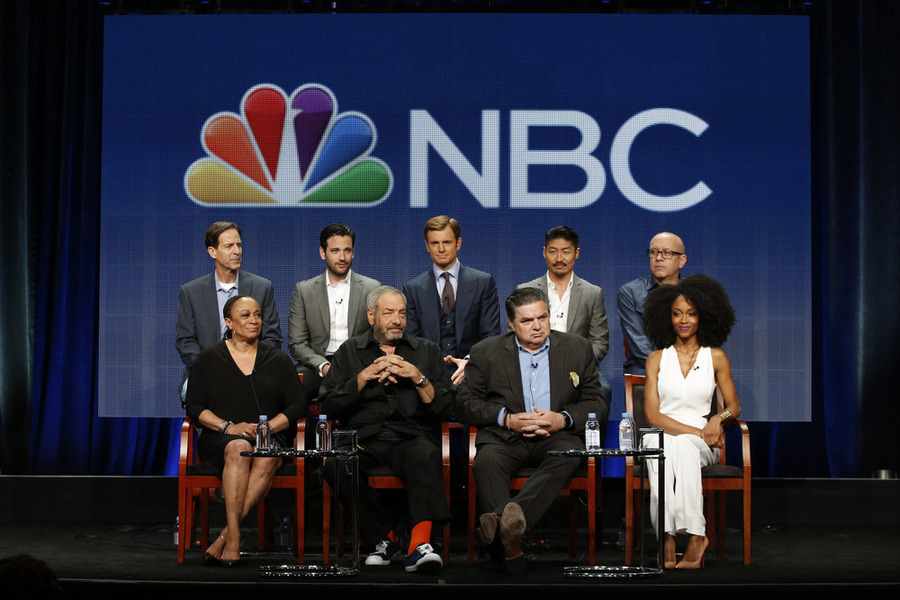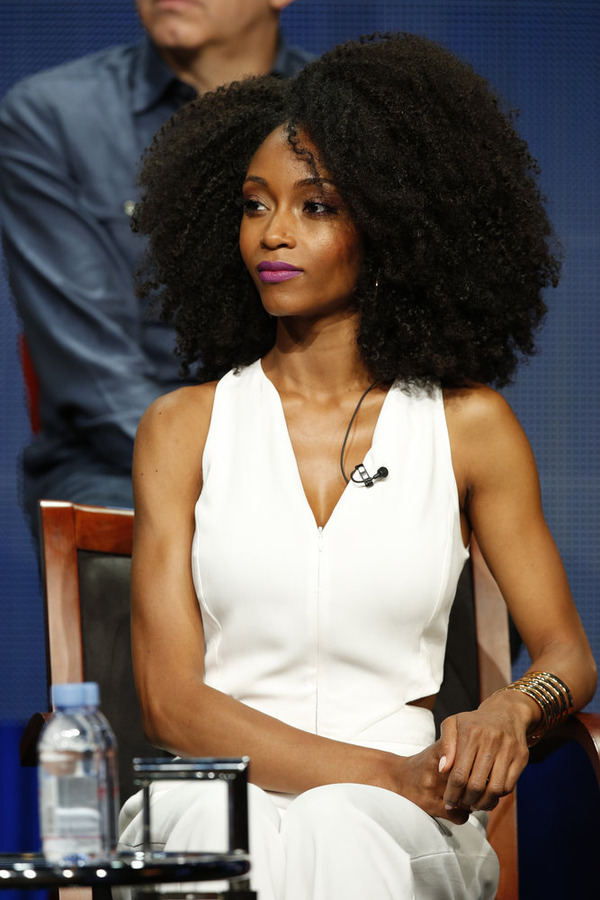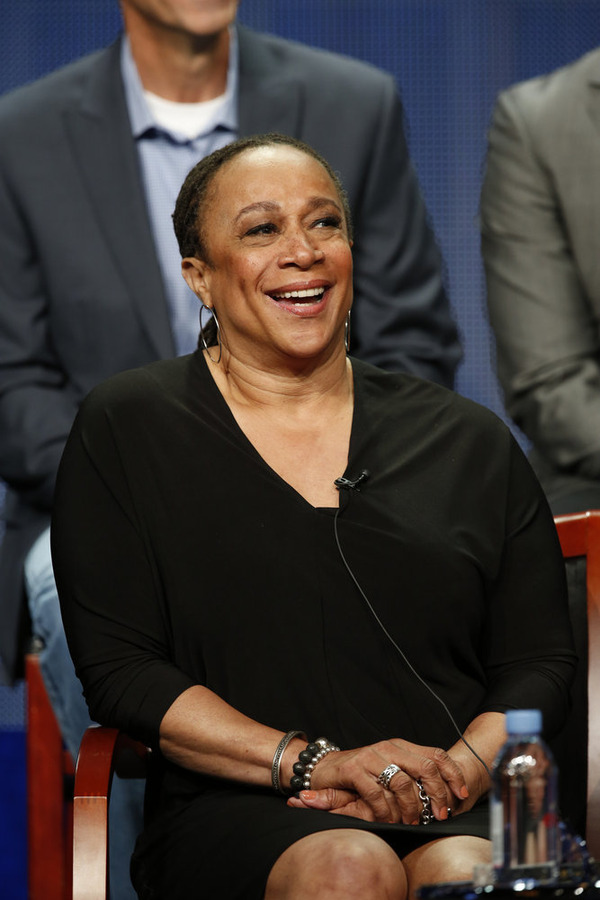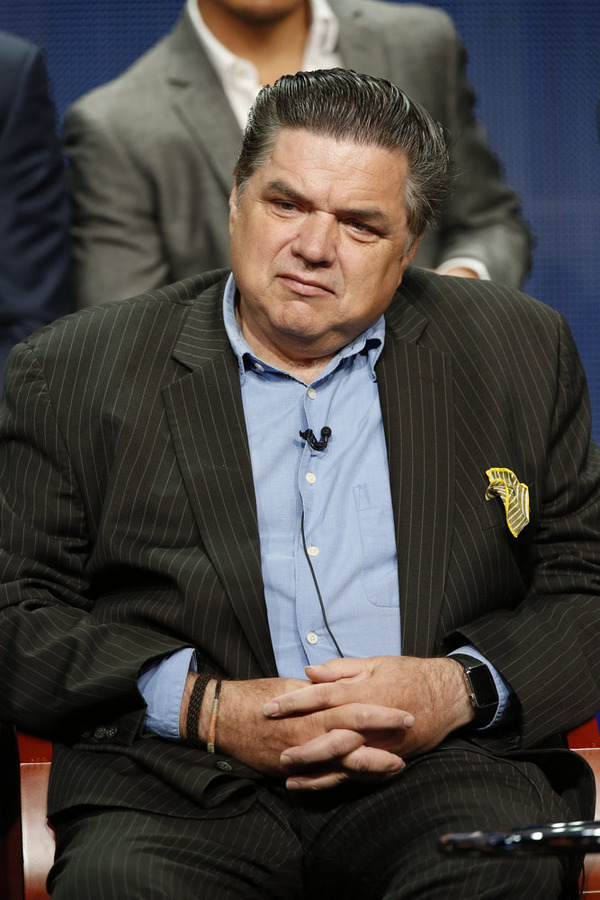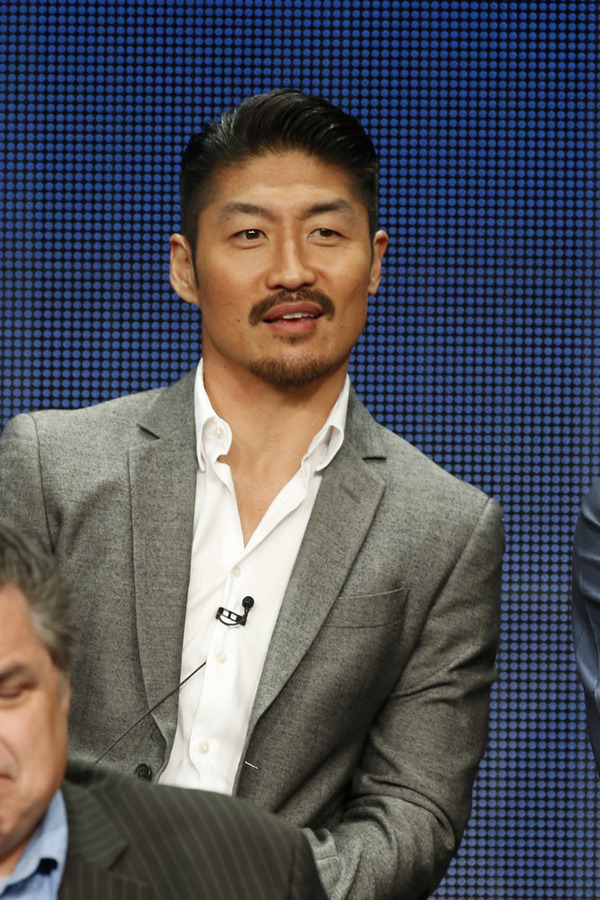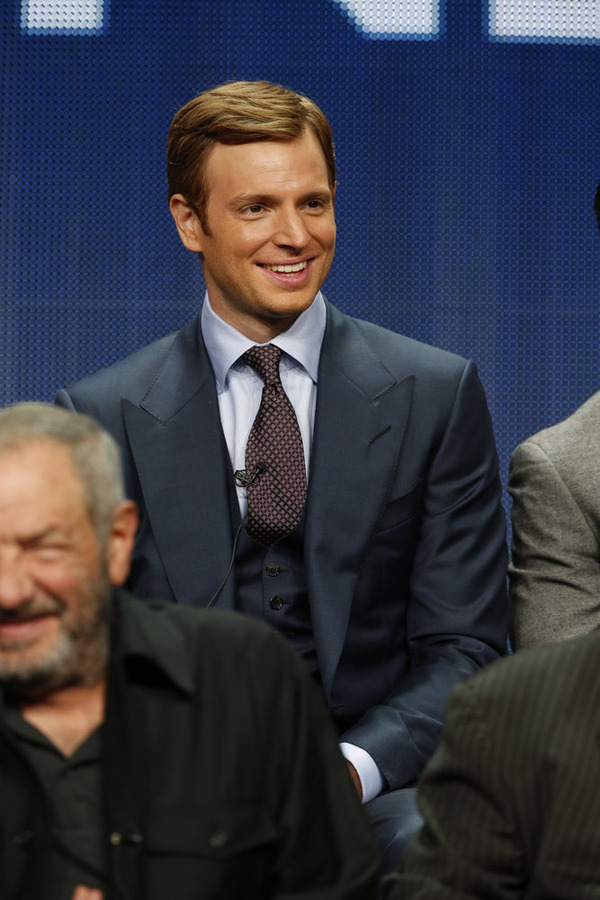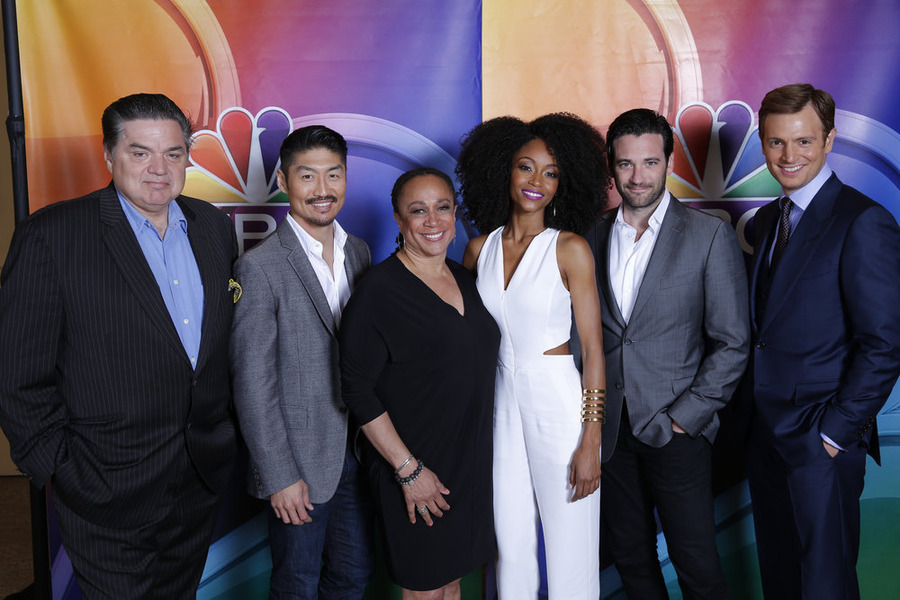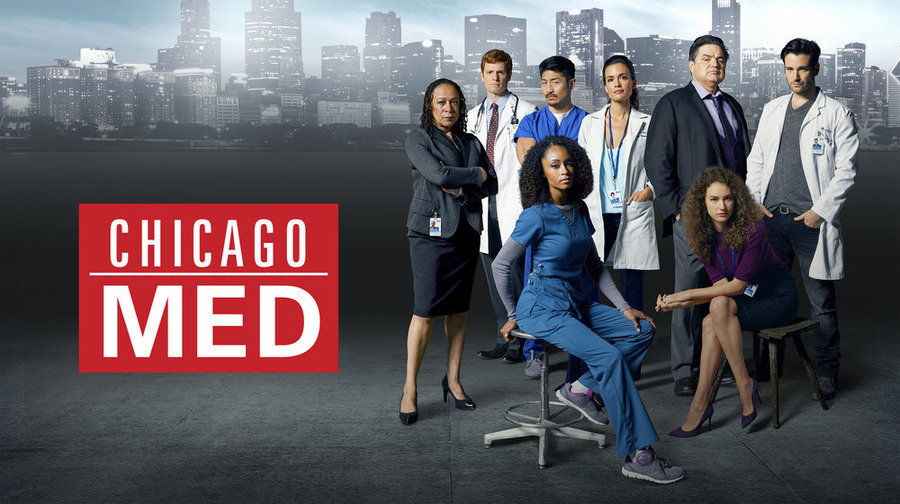
Chicago Med is the newest installment of the “Chicago” franchise and focuses on the city’s newest state-of-the-art trauma center. OHSOGRAY attended NBC’s recent Television Critics Association presentation, where the stars and producers talked about what viewers can look forward to.
Chicago Med premieres November 17, 9-10pm ET on NBC.
Dick, one of the hallmarks of your shows has been that “ripped from the headline” drama, […] how many medical headlines are you going to be able to rip?
Dick Wolf: “[R]ipped from the headlines” is a good umbrella for the transmission of information. And “ripped from the headlines” in medicine may be from the medical section. The aim here is, every week, if you watch the show, you will get at least one piece of medical information that you probably don’t know. And that can be something that is in the consciousness of the country, in the zeitgeist. It can be a specific story that kicks off… I mean, the Ebola story was obvious because it was a matter of concern. But there are other medical stories in terms of the right to life, the right to…how everything from organs are transmitted or given permission and what that leads to, to sex education for kids in school. And everything that touches on our medical or our physical lives is fair game for us. So “ripped from the headlines” is a broad umbrella for “ripped from the zeitgeist,” “ripped from what people are concerned about.” It’s probably not going to be a front page headline.
S. Epatha Merkerson: Healthcare issues as well.
[For the producers] [What do you consider in doing crossovers during the season?]
Dick Wolf: Let me just answer it briefly. The crossovers are incredible ratings engines for us. What we can’t do is have them become commonplace. So we basically have an agreement we’re going to do three this season, but they won’t include all the shows. Yeah, it’s planned. And then you come up with…where one of the shows is working on a story that can expand. But no, it’s planned.
Mr. Donnell, you died on your last two shows. Is it safer to be in a hospital?
Colin Donnell: I hope so. At least I’m surrounded by people who could potentially save me. It’s becoming a thing I’m hoping not to repeat on this one, but that’s up to these guys, I suppose.
[For Yaya] Are we going to see [your character] evolve? Is she a little bit shy and fragile at first? And is that anything at all like you, or are you actually a loud, flamboyant person in real life?
Yaya DaCosta: Well, I don’t think April’s shy. I think she was a little shaken up by all of the different things that were going on in the hospital that day and just needed that extra breath to take charge. But she’s usually in charge. I mean, she’s the nurse that the doctors turn to when something needs to get done. She’s the liaison between all the other nurses and the doctors, as well as the patients when the doctors are too busy to speak to the patients in a calm, compassionate way and explain things. So she’s the person that kind of keeps the hospital running generally. I think that moment you’re referring to is just an “OK, let’s do it,” you know.
And what are you like in real life?
Yaya DaCosta: Sometimes … I mean, it depends on what aspect of life. In my home, yes. In … usually no. Usually I’m, like, the quiet student, especially when I’m in the company of…
S. Epatha Merkerson: That would be me.
Yaya DaCosta: …seasoned actors like these.
S. Epatha Merkerson: That would be me.
Yaya DaCosta: That’s Epatha.
[For S. Epatha Merkerson] Did you think, “Boy, I just spent 16 years or so being in charge on a Dick Wolf show, and I shall now go back and be in charge on a Dick Wolf show”?
S. Epatha Merkerson: About two seconds, yeah. It was a no brainer for me. I love working with Dick. I love the productions that we’ve done together. I love the people that he surrounds himself with. It was a no brainer.
Can you contrast the managerial styles of the two characters?
S. Epatha Merkerson: Well, you know, the one thing that Van Buren was, most assuredly, was in charge. And I don’t know if she was as flawed as I would have wanted her to be. I think that with Sharon Goodwin, there’s an opportunity to show a woman who is very focused on her job, but also who is somewhat flawed. I think that’s why it was sort of a no brainer, because he knows what I did for 17 seasons. So to bring me in on that same line, I think, would be boring. I’m looking forward to having a full person to work with. But, you know, it’s a part of my personality, you know. I am a little bossy.
Colin Donnell: You could order my drink any time. It’s all right.
S. Epatha Merkerson: But yeah, I think you’ll see a difference in characters. And you’ll see…certainly you’ll see the similarities as well.
I understand that you may be re-upping your Mary Lou Williams project at the Kennedy Center next year. I was curious when that would be and…
S. Epatha Merkerson: May 16th.
May 16th. And will you be directing any episodes of this project?
Dick Wolf: You see, this isn’t personal at all. We’ve been doing this for 23…
S. Epatha Merkerson: 25.
Dick Wolf: …28 years.
S. Epatha Merkerson: 28, yeah.
Dick Wolf: Our actors don’t direct on their own shows. It’s just…because there are many talented people who would want to do that.
It’s one thing to act and do a scene or whatever, but then when you add the medical jargon on top of that, has that been difficult for any of you?
Brian Tee: I think a lot of medical jargon is just stuff we’re not familiar with. I think, as artists, once you get familiar with the thing you’re actually saying, it becomes a little easier. Speaking for myself, I’ve been able to speak other languages in the other things that I’ve done, and it’s really practice and repetitiveness for it to kind of feel a little flawless, like you’re speaking it. I think all of us would want to kind of emulate and repeat the same things and kind of give the audience an essence of us that we are what they feel when they go into the hospital. You know, I think everything should feel real, and I feel that we’re going to work to do that.
Colin Donnell: That’s not to say that there’s not going to be some great outtakes, I’m sure.
Nick Gehlfuss: It’s like anything. You don’t take on more than you need at the moment. It becomes overwhelming. We’ll learn it on a need-to-know basis, and that will keep it all very present.
Yaya DaCosta: We have great people on set also to refer to when we need clarification on pronunciation or the way to hold something, certain tools. We have really great references. The writers know what they’re doing. The on set doctors are great. So yeah, I would agree with Brian, though, it is kind of like another language. And it’s exciting. Language is great.
[What is it like filming in Chicago?]
Colin Connell: We were just discussing Canada Goose backstage.
Brian Tee: Luckily we’ll be shooting indoors, hopefully, at the hospital, where most of the stuff takes place.
S. Epatha Merkerson: Well, can I say Dick told me that I’d be shooting indoors? Did you see me indoors?
Oliver Platt: I’m incredibly excited about shooting in Chicago and getting to know Chicago better. But the community that I’m actually excited about joining is the community of these three shows. I mean, what was really remarkable…I speak for myself, and I think I speak for the rest of the cast…is that the community, the sense of community that exists on “Fire,” on “Chicago P.D.” is truly remarkable. They made us feel so welcome. They clearly enjoy each other so much. I think it’s palpable on the screen. In a larger sense the idea of…. I think what Dick is doing is actually it’s pretty exciting. I mean, franchises have spun off shows before, but never into an active matrix, if you will, of these shows that are being aired. And you just have this, that’s the part…that’s the community that I’m excited about.
[For the producers] How many more shows do you see in the “Chicago” franchise? You’ve got three so far. Can you see it going to a fourth? And beyond that, what’s the status of the “Law & Order” sequel or spinoff or prequel?
Dick Wolf: First of all, there would never be a fourth unless this works. If this works, who knows what is possible in the future. The concern of everybody now is to make this show have the same impact that “Fire” and “PD” have had. And the future, nobody knows what the future holds, including what’s going to happen on “Law & Order.” As you heard, everybody wants to do it. It is a question of most of the people involved are very successful in their careers, and to try to get everything in sequence is much more difficult than it looks on the outside. I am always an optimist. I would love to do it. I think I speak for the network. They would love to do it if we can make it work.
[For Oliver Platt] Can you [talk] about this character?
Oliver Platt: You know, it was actually one of my first questions, because this story in the spinoff episodes, it’s very specific. But the truth of the matter is that there are big holes, big holes in the public health system in general, particularly in mental health. And the idea that we’ve been talking about is that this is a guy that maybe is not necessarily a born administrator, but he’s sort of taken this job because he is very much interested in providing psychiatry for people who don’t necessarily have $400 an hour. A significant majority of cases that come into regular emergency rooms are, in fact, psychiatric cases. Because there’s psychiatric emergency rooms are actually few and far between, and the truth is that there’s actually all sorts of very organic, everyday storylines, reasons you have psychiatrists not just in a general hospital environment in general, but in emergency rooms too. And so, again, we’re at a tiny bit of a disadvantage because we haven’t started shooting. But I’m very confident based on the research that I’ve done that there are just a whole lot of opportunities. There are real world entry for a psychiatrist in a general hospital.
Can you [talk] a little bit about who Daniel Charles is, what kind of guy he is?
Oliver Platt: Daniel Charles, I think, is a guy my sense is that you don’t find out a lot about Daniel Charles from Daniel Charles, you know. He’ll probably always might answer a question, tend to answer a question with a question. But I or helping other people might be the way that he sort of gets through his day. Psychiatrists are often very interesting characters, you know.
Dick Wolf: I’ll give you one insight. He’s been married four times. He has one child with each of his ex-wives.
Oliver Platt: My character. That’s not me.
Dick Wolf: And they range in age from about 30 down to 5 or 6.
[For the producers] now, you had portions of the hospital blown up in the embedded pilot. How fast is the pace going to be and how crisis ridden is each episode going to be?
Andrew Dettman: We’re starting out, of course, with a…we’re going to have a brand new, very high-tech beautiful new emergency department, necessitated, obviously, because we blew the last one up. But it will be a fast paced, the way we’re arranging the set itself, it gives you the chance for a lot of dynamic action and moving from one case to the next and being able to hand off sort of at a center station. So it will be that fast paced show you’re anticipating. But we’re also taking cases and following them through. A patient comes in and maybe they’re a medical mystery and it takes us a while to diagnose what the problem is. So it won’t be frantic because there are times we want to slow down and really spend the time exploring what that illness is. Medical mysteries is going to be a big part of what we do. I shut them down.
Do you envision getting “Special Victims Unit” involved here early on, or do you think that’s going to take some time?
Dick Wolf: Well, Matt, don’t we? Once this year.
Matt Olmstead: Yeah, we’re going to do a four way crossover with three “Chicago” shows and “SVU,” the jumbo crossover as we’re calling it.
Matt Olmstead: And then potentially another just a “Chicago”-only three week crossover.
How early in the season does the four way crossover happen?
When you try to interweave characters of four shows into one story, can you talk about the intricacy of that a little bit, because that amps up what you’ve done already?
Andrew Dettman: You’re starting to scare me a little bit.
Matt Olmstead: We’ve done a couple of them. We’ve done three crossovers so far. They’re very daunting. And ultimately, like any kind of artistic endeavor, the daunting ones turn out to be the ones that are most gratifying. A lot of work goes into it. A lot of people pitch in, but at the end, we’ve been really, really proud of what we’ve come up with and we hope to continue that for sure going forward.
S. Epatha Merkerson: I think it will be cool to see what happens when Benson runs into Goodwin.
Dick Wolf: You were only on two episodes. You look a lot like somebody I knew.
S. Epatha Merkerson: Yeah. Right.
What goes through your mind when you find out someone’s interested in you for a Dick Wolf show?
Brian Tee: The answer is yes.
Yaya DaCosta: Yes.
Oliver Platt: That’s a good day.
Brian Tee: It’s like how many different ways can you say “please”?
Yaya DaCosta: Drop everything and go.
Can you talk about that? What is it about working on these shows?
Colin Donnell: Well, there’s such a history of quality. There’s such a history of getting the opportunity to work on great scripts, on shows that are watched by so many people and beloved by so many people, and also being able to work with the type of people you see here on stage. Universally, there’s just an amazing quality, like Epatha was saying, to the personnel that Dick has surrounded himself with over the last 25 years. And so to be included in that is an honor and a pleasure and supremely exciting.
Yaya DaCosta: There’s a certain level of confidence that you get in knowing that you’re going to be taken care of and you’re going to be in that great company, like Colin was saying. As actors, we do all these projects, whether they’re independent films or theater, movies that don’t get attention, because we’re just small pieces of these big puzzles. And no matter how well we do, we never know how something’s going to turn out. So going into it, knowing that you’re in stellar hands is just such a comforting feeling and it just makes us work even harder to be our best.
[For S. Epatha Merkerson] Can you just reflect on playing a new character within something that involves “Law & Order” again?
S. Epatha Merkerson: Listen, I expect that it will be similar to the 17 years I spent on “Law & Order.” You wouldn’t… no actor will stay that long unless something is happening that’s allowing them to feel good about the work that they’re doing, good about the people that they’re working with. I mean, it would be asinine to stay in something that long. So what I expect and what I received from “Law & Order,” I expect and know that I will receive it in this group. It’s another group of writers, an entirely new group of producers. But the cog in this wheel for me is Dick Wolf. And over the 25 years… because I actually did an episode in the very first season of “Law & Order”… so I’ve been working with Dick the longest. So what I’ve learned about this man is that he is also protective, and I’m speaking only of myself, but I know that about all the actors, that he’s very protective of us and he wants what’s good for us. So, you know, that I’m doing this show and working with this company again has all to do with the people that he surrounds himself with. So I’ve been spoiled. I’ve been able to work in New York and stay in my own apartment, and I’m looking forward to going to Chicago. I’m looking forward to working with this new group of producers and writers. And having met everyone, literally I already have a feeling about what this is going to be. And I think you all are going to be extraordinarily pleased. This man never does anything that people won’t enjoy watching.
And truly, one of the things that I always said about “Law & Order,” and it goes to the comment that the gentleman had earlier, it’s entertainment, because it’s television, and that’s important. But I think television at its best is a teaching tool as well. And at the end of the day, if you leave that hour and you’ve picked up something and you’ve enjoyed what you’ve watched, that’s a hell of a show, and so I’m very excited looking at this new character and to see what she could be and be for me as an actor.
Within this universe, does anybody in “Chicago” or anybody in the “Law & Order: SVU” office ever think, boy, when we have an out-of-state case, why is it always them?
Dick Wolf: It’s only two times a year. They do lots of cases. In all seriousness, it’s not… we live… television is a heightened reality. There are 35,000 cops in New York. It’s unlikely that a lot of them would know cops in Chicago. It’s a construct. But it goes to the level of the actors involved. I mean, nobody is… as far as I know, nobody has looked at the crossovers and gone, “That’s ridiculous. Those people wouldn’t do that.” It’s a credit to the writing and the actors.
So it’s just an accepted fact of the universe?
Dick Wolf: I don’t know if it’s an accepted fact in the universe, but in our universe it’s a rational way of approaching it.
